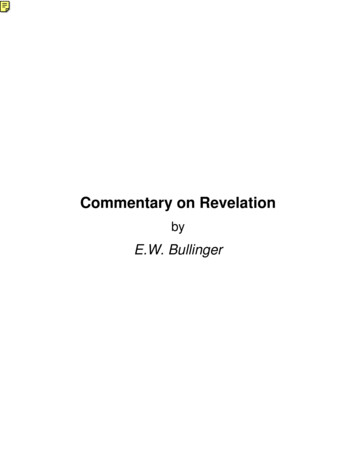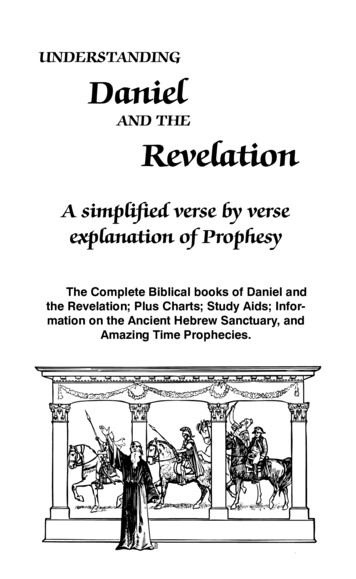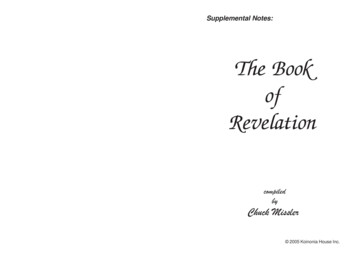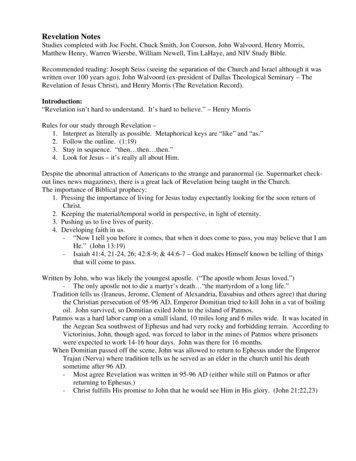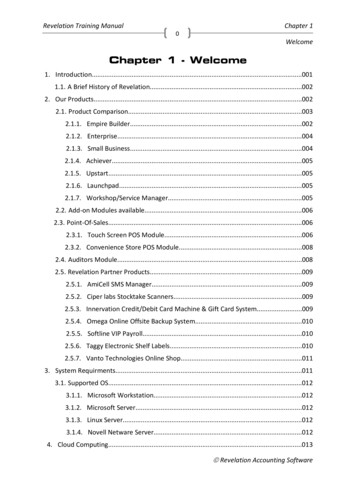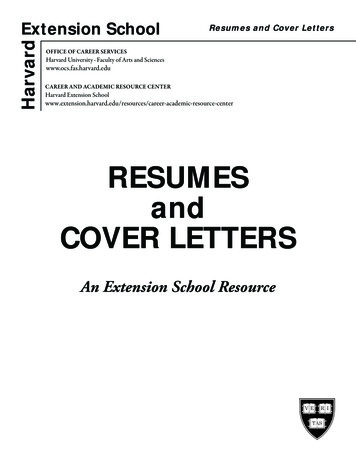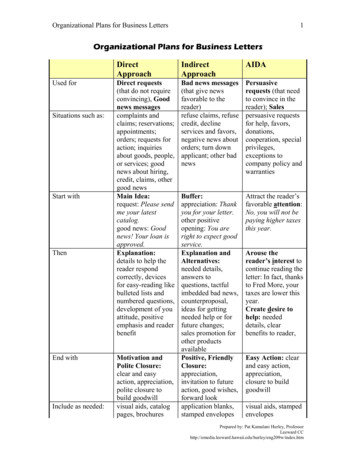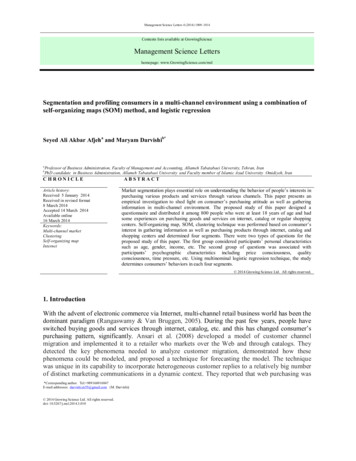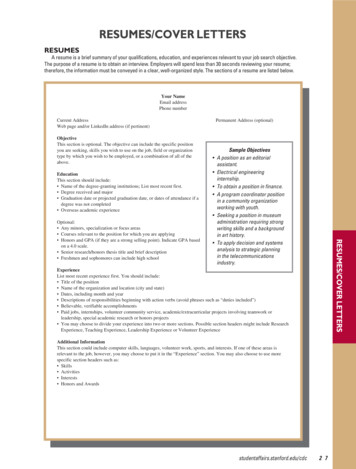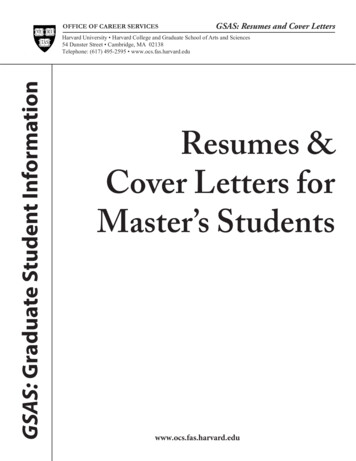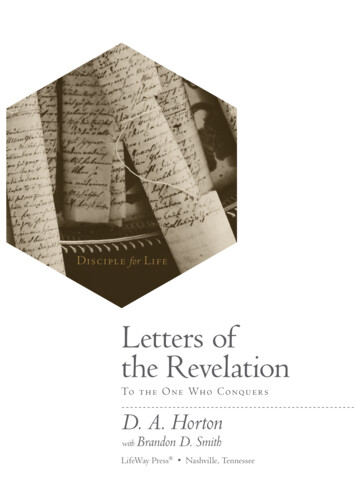
Transcription
Di sc i pl e for Li f eLetters ofthe RevelationTo t h e O n e Who C onqu e r sD. A. Hortonwith BrandonD. SmithLifeWay Press Nashville, Tennessee
Published by LifeWay Press 2017 D. A. HortonNo part of this book may be reproduced or transmitted in any form or by any means, electronic ormechanical, including photocopying and recording, or by any information storage or retrieval system,except as may be expressly permitted in writing by the publisher. Requests for permission should beaddressed in writing to LifeWay Press ; One LifeWay Plaza; Nashville, TN 37234-0152.ISBN 978-1-4627-4208-0 Item 005793179Dewey decimal classification: 228Subject headings: CHURCH \ BIBLE. N.T. REVELATION—STUDY AND TEACHING \ END OF THE WORLDScripture quotations are taken from the Christian Standard Bible , Copyright 2017 by Holman BiblePublishers. Used by permission. Christian Standard Bible and CSB are federally registered trademarksof Holman Bible Publishers.To order additional copies of this resource, write to LifeWay Resources Customer Service; One LifeWayPlaza; Nashville, TN 37234-0113; fax 615-251-5933; call toll free 800-458-2772; order online at lifeway.com; email orderentry@lifeway.com; or visit the LifeWay Christian Store serving you.Printed in CanadaGroups Ministry Publishing LifeWay Resources One LifeWay Plaza Nashville, TN 37234-0152
ContentsAbout the Authors 4Introduction 5How to Use This Study 6The HEAR Journaling Method for Reading Scripture 8Week 1: Ephesus: The Church without Love 12Week 2: Smyrna: The Church That Was Persecuted 30Week 3: P ergamum and Thyatira: The Churcheswith Bad Reputations 48Week 4: Sardis: The Church That Fell Asleep 66Week 5: Philadelphia: The Church That Endured 84Week 6: Laodicea: The Church That Turned Lukewarm 102Leader Guide 120Tips for Leading a Small Group 132Group Information 135
Letters of the RevelationAbout the AuthorsD. A. HORTON serves as the pastor ofReach Fellowship, a church plant in NorthLong Beach, California, and as the chiefevangelist for the Urban Youth WorkersInstitute. Prior to his current roles, heserved as an urban church planter/pastorin Kansas City, Missouri; a national coordinator of Urban Student Ministries at theNorth American Mission Board; and the executive directorof ReachLife Ministries, a nonprofit ministry of Reach Records.D. A. earned a bachelor of science in biblical studies from Calvary BibleCollege and a master’s degree in Christian studies from Calvary TheologicalSeminary. He’s currently working on a PhD in applied theology with aNorth American missions emphasis at Southeastern Baptist TheologicalSeminary.D. A. is the author of GOSPEL, DNA: Foundations of the Faith, and Bound to BeFree: Escaping Performance to Be Captured by Grace. He and his wife, Elicia, havetwo daughters, Izabelle and Lola, and one son, D. A. Jr. (aka Duce).BRANDON D. SMITH helped develop this Bible study. Brandon workswith the Christian Standard Bible at LifeWay Christian Resources andteaches theology at various schools. The author of Rooted: Theology for GrowingChristians and They Spoke of Me: How Jesus Unlocks the Old Testament, Brandon alsocohosts the Word Matters podcast. He holds a BA in biblical studies fromDallas Baptist University and an MA in systematic and historical theologyfrom Criswell College. He’s pursuing a PhD in theology at Ridley Collegein Melbourne, Australia. Brandon lives near Nashville, Tennessee, with hiswife, Christa, and their two daughters, Harper and Emma.4
IntroductionWork. Sometimes we love it, sometimes we hate it, and sometimes we justget tried of loving it or hating it. We all work. Some of us work a regularjob at a factory or an office. Some of us work at home. Some of us arestudents. Regardless, we all know that work is an inevitability in life.The Bible defines works that are part of our life in Christ. Nothing we docan earn salvation; it’s a gift from God. However, James 2:17 says, “Faith,if it doesn’t have works, is dead by itself.” In other words, although workscan’t bring salvation, once we’re saved, our works show and prove our faith.And like our everyday work, our works in Christ are inevitable, and theyhave their ups and downs.In Revelation 2–3 Jesus addressed the works of the seven churches in AsiaMinor. Over the next six weeks we’ll look at the ups and downs of thosechurches and draw out implications for our churches today:Ephesus: The Church without LoveSmyrna: The Church That Was PersecutedPergamum and Thyatira: The Churches with Bad ReputationsSardis: The Church That Fell AsleepPhiladelphia: The Church That EnduredLaodicea: The Church That Turned LukewarmMy prayer is that we’ll be honest with our small groups and ourselves as welook at the highs and lows of each church in Revelation. By digging deeplyinto the truths of Scripture, may we learn more about who we are and whoChrist is for us. May we be the ones who conquer.5
Letters of the RevelationHow to Use This StudyThis Bible study book includes six weeks of content. Each week has anintroductory page summarizing the focus of the week’s study, followedby content designed for groups and individuals.GROUP SESSIONSRegardless of the day of the week your group meets, each week of contentbegins with the group session. This group session is designed to be one houror more, with approximately 15 to 20 minutes of teaching and 45 minutesof personal interaction. It’s even better if your group is able to meet longerthan an hour, allowing more time for participants to interact with one another.Each group session uses the following format to facilitate simple yet meaningful interaction among group members, with God’s Word, and with thevideo teaching by D. A. Horton.StartThis page includes questions to get the conversation started and to introducethe video segment.WatchThis page includes key points from the video teaching, along with spacefor taking notes as participants watch the video.DiscussThese two pages include questions and statements that guide the groupto respond to the video teaching and to relevant Bible passages.PrayThis final page of each group session includes a prompt for a closing time ofprayer together and space for recording prayer requests of group members.6
How to Use This StudyINDIVIDUAL DISCOVERYEach Disciple for Life small-group resource provides individuals with optionalactivities during the week, appealing to different learning styles, schedules,and levels of engagement. These options include a plan for application andaccountability, a Scripture-reading plan with journaling prompts, a devotion,and two personal studies. You can choose to take advantage of some or allof the options provided.This Week’s PlanImmediately following the group session’s prayer page is a weekly planoffering guidance for everyone to engage with that week’s focal point,regardless of a person’s maturity level or that week’s schedule.ReadA daily reading plan is outlined for Scriptures related to the group session.Space for personal notes is also provided. Instructions for using the HEARjournaling method for reading Scripture can be found on pages 8–11.ReflectA one-page devotional option is provided each week to help members reflecton a biblical truth related to the group session.Personal StudyTwo personal studies are provided each week to take individuals deeper intoScripture and to supplement the biblical truths introduced in the teachingtime. These pages challenge individuals to grow in their understandingof God’s Word and to make practical application to their lives.LEADER GUIDEPages 120–31 at the back of this book contain a guide that develops a leader’sunderstanding of the thought process behind questions and suggests waysto engage members at different levels of life-changing discussion.7
Letters of the RevelationThe HEAR Journaling Methodfor Reading ScriptureDaily Bible ReadingDisciple for Life small-group Bible studies include a daily reading plan for eachweek. Making time in a busy schedule to focus on God through His Word isa vital part of the Christian life. If you’re unable to do anything else providedin your Bible study book during a certain week, try to spend a few minutes inGod’s Word. The verse selections will take you deeper into stories and conceptsthat support the teaching and discussion during that week’s group session.Why Do You Need a Plan?When you’re a new believer or at various other times in your life, you mayfind yourself in a place where you don’t know where to begin reading yourBible or how to personally approach Scripture. You may have tried the openand-point method when you simply opened your Bible and pointed to averse, hoping to get something out of the random selection from God’s Word.Reading random Scriptures won’t provide solid biblical growth any morethen eating random food from your pantry will provide solid physical growth.An effective plan must be well balanced for healthy growth. When it comesto reading the Bible, well balanced and effective mean reading and applying.A regular habit is great, but simply checking a box off your task list whenyou’ve completed your daily reading isn’t enough. Knowing more aboutGod is also great, but simply reading for spiritual knowledge still isn’tenough. You also want to respond to what you’re reading by taking actionas you listen to what God is saying. After all, it’s God’s Word.To digest more of the Word, Disciple for Life small-group Bible studies notonly provide a weekly reading plan but also encourage you to use a simplifiedversion of the HEAR journaling method. (If this method advances yourpersonal growth, check out Foundations: A 260-Day Bible-Reading Planfor Busy Believers by Robby and Kandi Gallaty.)8
The HEAR Journaling Method for Reading ScriptureJournaling What You HEAR in God’s WordYou may or may not choose to keep a separate journal in addition to thespace provided in this book. A separate journal would provide extra spaceas well as the opportunity to continue your journal after this study is completed. The HEAR journaling method promotes reading the Bible with alife-transforming purpose. You’ll read in order to understand and respondto God’s Word.The HEAR acronym stands for highlight, explain, apply, and respond. Each ofthese four steps creates an atmosphere for hearing God speak. After settlingon a reading plan, like the one provided in this book in the “Read” sectioneach week, establish a time for studying God’s Word. Then you’ll be readyto HEAR from God.Before You Begin: The Most Important StepTo really HEAR God speak to you through His Word, always begin yourtime with prayer. Pause and sincerely ask God to speak to you. It’s absolutely imperative that you seek God’s guidance in order to understand HisWord (see 1 Cor. 2:12-14). Every time you open your Bible, pray a simpleprayer like the one David prayed: “Open my eyes so that I may contemplatewondrous things from your instruction” (Ps. 119:18).H HighlightAfter praying for the Holy Spirit’s guidance, open this book to the week’sreading plan, open a journal if you’d like more space than this book provides, and open your Bible. For an illustration let’s assume you’re readingPhilippians 4:10-13. Verse 13 may jump out and speak to you as somethingyou want to remember, so you’d simply highlight that verse in your Bible.If keeping a HEAR journal, on the top line write the Scripture reference and the date andmake up a title to summarize the meaning of the passage. Then write the letter H and recordthe verse that stood out and that you highlighted in your Bible. This practice will make it easyto look back through your journal to find a passage you want to revisit in the future.9
Letters of the RevelationE ExplainAfter you’ve highlighted your verse(s), explain what the text means. Mostsimply, how would you summarize this passage in your own words? Byasking some simple questions, with the help of God’s Spirit, you canunderstand the meaning of the passage or verse. (A good study Bible canhelp answer more in-depth questions as you learn to explain a passageof Scripture.) Here are a few good questions to get you started: Why was the verse or passage written?To whom was it originally written?How does the verse or passage fit with the verses before and after it?Why would the Holy Spirit include this passage in the Bible book?What does God intend to communicate through the text?If keeping a HEAR journal, below the H write the letter E and explain the text in yourown words. Record any answers to questions that help you understand the passage of Scripture.A ApplyAt this point you’re beginning the process of discovering the specific personalword God has for you from His Word. What’s important is that you’reengaging with the text and wrestling with the meaning. Application is theheart of the process. Everything you’ve done so far coalesces under thisheading. As you’ve done before, answer a series of questions to discoverthe significance of these verses to you personally, questions like: How can this verse or passage help me? What’s God saying to me? What would the application of this verse look like in my life?These questions bridge the gap between the ancient world and your worldtoday. They provide a way for God to speak to you through the specificpassage or verse.10
The HEAR Journaling Method for Reading ScriptureIf keeping a HEAR journal, write the letter A under the letter E, where you wrote a shortsummary explaining the text. Challenge yourself to write between two and five sentencesabout the way the text applies to your life.R RespondFinally, you’ll respond to the text. A personal response may take on manyforms. You may write an action step to do, describe a change in perspective, or simply respond in prayer to what you’ve learned. For example, youmay ask for help in being bold or generous, you may need to repent ofunconfessed sin, or you may need to praise God. Keep in mind that you’reresponding to what you’ve just read.In this book or in your journal, record your personal application of eachpassage of Scripture. You may want to write a brief explanation-andapplication summary: “The verse means, so I can or will.”If keeping a HEAR journal, write the letter R, along with the way you’ll respond to whatyou highlighted, explained, and applied.Notice that all the words in the HEAR method are action words: highlight,explain, apply, respond. God doesn’t want us to sit back and wait for Himto drop truth into our laps. God wants us to actively pursue Him insteadof waiting passively. Jesus said:Ask, and it will be given to you. Seek, and you will find.Knock, and the door will be opened to you.Matthew 7:711
Ephesus:The Churchwithout LoveWeek 1
Ephesus: The Church without LoveSometimes we don’t understand a movie until the end. Good storytellerstake us on a journey, revealing a little at a time but not unveiling everything until the very end. Once we see the ending, the rest of the storymakes sense. The Book of Revelation is a perfect example of this truth.The apostle John wrote the seven letters recorded in Revelation 2–3to specific churches in specific locations in ancient Asia Minor. Thesechurches existed two thousand years ago, but the Storyteller—GodHimself—gave them and us a glimpse into the future through His revelation to John. We know this because throughout the seven letters Jesusused the phrase “the one who conquers.” Jesus used future tense to helpthe churches understand their present tense.Our only hope to be conquerers is to look at Jesus, the One who conquered sin and death for us. In Him we can look out at our missionfield—wherever that may be—with confidence, knowing we can conquerbecause of the victory given to us in Jesus’ finished work on the cross.We’ll begin by looking at the church in Ephesus. The Ephesian Christianswere excellent theologians. They stood firm against false doctrine andfake Christians, and their perseverance was apparently on point. Thoughthe surface looked shiny, Jesus knew they were rotting from the inside;they had forgotten how to love. This was the loveless church.When Jesus told the church that He’s “the one who holds the seven stars inhis right hand and who walks among the seven golden lampstands” (Rev. 2:1),He was telling them that He’s intimately close to them. Jesus holds theentire church—the universal body of Christ—in His hand, and as He promised His disciples in Matthew 28:20, He’s still with us. He was so near to theEphesian believers that He could clearly see their outward works, and withperfect knowledge as God in the flesh, He could also see their hearts.13
Letters of the RevelationStartWelcome everyone to session 1 of Letters of the Revelation. Use the followingcontent to begin your group session together.We mentioned in the introduction to this study that work is an inevitabilityin our daily lives, both as everyday citizens of this world and as believers inChrist. Through the letters to the seven churches in the Book of Revelation,we’ll see again and again that Jesus noticed the works these churches weredoing but almost always had corrections and promises for them.Tell the group where you work and why you chose to work there.Do you love what you do? Why or why not?We often don’t work from pure love for our jobs. Often we work to supportour families or ourselves or to gain experience for a better job down theroad. But even when we love our jobs, we can get bored with them after afew years of the daily grind. The truth is, anything can become familiarand grow stale, like a once-delicious loaf of bread.We see this tendency in our own lives and in the lives of others. Successfulathletes often retire, even when they have a few more years of tread on theirtires, because they lose their love for the game. Sometimes friendships orrelationships end because people struggle to love one another. We can evenget tired of our favorite desserts!In this session D. A. Horton will introduce us to Jesus’ message to the churchin Ephesus and will highlight the importance of renewing our love for Jesus.Read Revelation 2:1-7 in preparation for the video and then watch video session 1.14
Ephesus: The Church without LoveWatchUse the space below to follow along and take notes as you watch video session 1.Realities in the Seven Letters1. Jesus was actually speaking to seven literal churches that were inexistence at the time of the giving of His revelation to the apostleJohn.2. Jesus is actually speaking about how we can walk in the victorythat He has secured for those who are part of the body of Christ.Jesus’ warnings to the seven churches in the Book of Revelation can giveus hope and clarity regarding principles that we can apply so that we canbe those who conquer in this life because of the victory that’s been givento us through the precious blood of Jesus Christ.Jesus is omniscient. He knows not only our words and our deeds. He hasfull, exhaustive knowledge of even our innermost thoughts that we neverexpress to anybody else.Corrections for the Church in Ephesus1. Remember.2. Repent.3. Return.The reward for loving your Savior with all you have is an eternal,uninterrupted, intimate fellowship with Him.15
Letters of the RevelationDiscussUse the following statements and questions to discuss the video.The most basic question we can ask when reading the letters of Revelationis “What’s Jesus saying to me through the
Daily Bible Reading Disciple for Life small-group Bible studies include a daily reading plan for each week. Making time in a busy schedule to focus on God through His Word is a vital part of the Christian life. If you’re unable to do anything else provided in your Bible study book during
